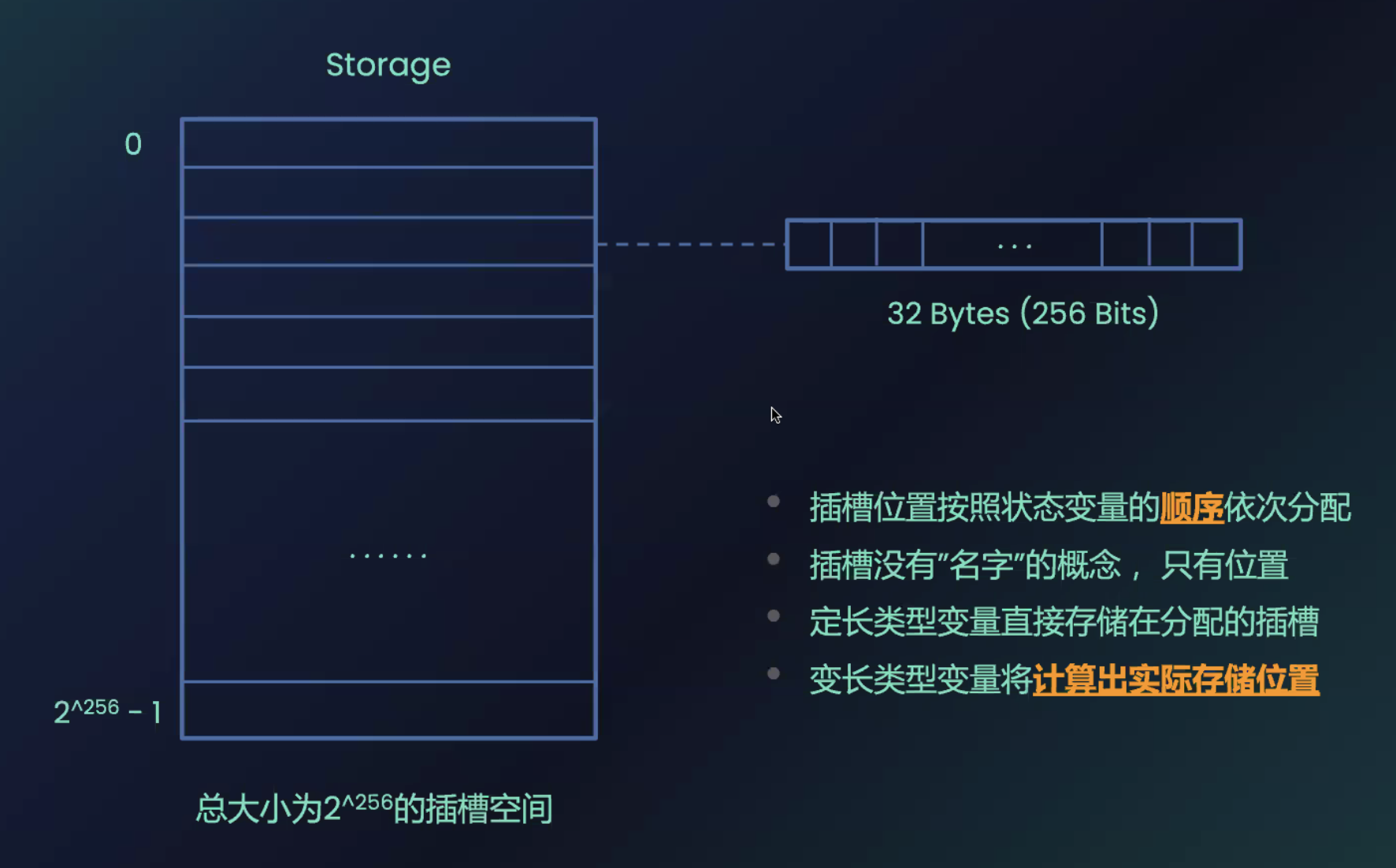Data Types
数据类型
Solidity EVM在宽256bit深2^256的栈空间存储合约数据- 合约内部数据分为定长数值类型和非定长的引用类型

数值类型
数值类型赋值时直接传递值,包含 boolean,整数型(uint8~uint256,int8~int256),address,定长bytes(bytes1~bytes32)
boolean类型是二值变量, 取值true|false,default:false- 运算符包括:
- !(非)
- && (与,短路规则,如果前者false,就不会执行后者)
- || (或,短路规则,如果前者true,就不会执行后者)
- == (判等)
- != (不等)
uint/int整型,default: 0- 运算符包括:
- 比较运算符,返回
bool (> < >= <= == !=) - 算数运算符
(+ - * / % ** << >>)
address类型address类型,可以使用payable()修饰,用于接收NativeToken(触发receiver()函数或缺省函数fallback()) 数值类型合约示例:
// SPDX-License-Identifier: MIT
pragma solidity ^0.8.26;
contract Static_variables {
bool public boo = true;
/*
uint stands for unsigned integer, meaning non negative integers
different sizes are available
uint8 ranges from 0 to 2 ** 8 - 1
uint16 ranges from 0 to 2 ** 16 - 1
...
uint256 ranges from 0 to 2 ** 256 - 1
*/
uint8 public u8 = 1;
uint256 public u256 = 456;
uint256 public u = 123; // uint is an alias for uint256
/*
Negative numbers are allowed for int types.
Like uint, different ranges are available from int8 to int256
int256 ranges from -2 ** 255 to 2 ** 255 - 1
int128 ranges from -2 ** 127 to 2 ** 127 - 1
*/
int8 public i8 = -1;
int256 public i256 = 456;
int256 public i = -123; // int is same as int256
// minimum and maximum of uint
uint256 public minUInt = type(uint256).min;
uint256 public maxUInt = type(uint256).max;
// minimum and maximum of int
int256 public minInt = type(int256).min;
int256 public maxInt = type(int256).max;
address public addr = 0xCA35b7d915458EF540aDe6068dFe2F44E8fa733c;
/*
In Solidity, the data type byte represent a sequence of bytes.
Solidity presents two type of bytes types :
- fixed-sized byte arrays
- dynamically-sized byte arrays.
The term bytes in Solidity represents a dynamic array of bytes.
It’s a shorthand for byte[] .
*/
bytes1 a = 0xb5; // [10110101]
bytes1 b = 0x56; // [01010110]
// Default values
// Unassigned variables have a default value
bool public defaultBoo; // false
uint256 public defaultUint; // 0
int256 public defaultInt; // 0
address public defaultAddr; // 0x0000000000000000000000000000000000000000
bytes1 public c; //0x00
}
引用类型
引用类型:array[]数组,bytes,定长数组,struct结构体,mapping映射
- 数组:动态数组拥有
push/pop内置函数,分别在数组最后增加或删除一个元素
// SPDX-License-Identifier: MIT
pragma solidity ^0.8.26;
contract Dynamic_variables_array {
// Several ways to initialize an array
uint256[] public indeterminate_arr;
uint256[] public indeterminate_init_arr = [1, 2, 3];
// Fixed sized array, all elements initialize to 0
uint256[10] public determinate_arr;
function get(uint256 i) public view returns (uint256) {
return indeterminate_arr[i];
}
// Solidity can return the entire array.
// But this function should be avoided for
// arrays that can grow indefinitely in length.
function getArr() public view returns (uint256[] memory) {
return indeterminate_arr;
}
function indeterminate_push(uint256 i) public {
// Append to array
// This will increase the array length by 1.
indeterminate_arr.push(i);
indeterminate_init_arr.push(i);
}
function determinate_push(uint256 index, uint256 i) public {
// Append to array
// This will increase the array length by 1.
determinate_arr[index] = i;
}
function indeterminate_pop() public {
// Remove last element from array
// This will decrease the array length by 1
indeterminate_arr.pop();
indeterminate_init_arr.pop();
}
function getLength() public view returns (uint256) {
return indeterminate_arr.length;
}
function remove_not_change_length(uint256 index) public {
// Delete does not change the array length.
// It resets the value at index to it's default value,
// in this case 0
delete indeterminate_arr[index];
delete determinate_arr[index];
}
// Deleting an element creates a gap in the array.
// One trick to keep the array compact is to
// move the last element into the place to delete.
function remove_change_length(uint256 index) public {
// Move the last element into the place to delete
indeterminate_arr[index] = indeterminate_arr[
indeterminate_arr.length - 1
];
// Remove the last element
indeterminate_arr.pop();
}
function examples_new_determinate_arr() external pure {
// create array in memory, only fixed size can be created
uint256[] memory a = new uint256[](5);
a[0] = 5;
}
}